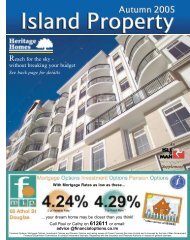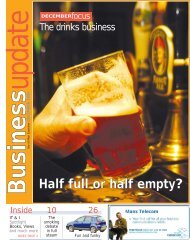p001front.qxd (Page 1) - Isle of Man Today
p001front.qxd (Page 1) - Isle of Man Today
p001front.qxd (Page 1) - Isle of Man Today
You also want an ePaper? Increase the reach of your titles
YUMPU automatically turns print PDFs into web optimized ePapers that Google loves.
<strong>Isle</strong> <strong>of</strong> <strong>Man</strong> Examiner, March 2006 Businessupdate 17<br />
PORTFOLIO<br />
PETER SHARKEY<br />
Peter.Sharkey@btinternet.com<br />
EQUITIES<br />
M&B’s one <strong>of</strong> those gems<br />
During idle<br />
moments — and<br />
I can assure you,<br />
there have not been too many <strong>of</strong><br />
those recently — I make a point <strong>of</strong><br />
examining what I call peripheral<br />
businesses, ones that do not<br />
necessarily fit my ideal criteria for<br />
stock selection, but which remain<br />
worthy <strong>of</strong> perusal because, well,<br />
you just never know…<br />
Over the past few years, I’ve<br />
looked at all sorts <strong>of</strong> angles and<br />
different sectors, with varying<br />
degrees <strong>of</strong> success, and about 18<br />
months ago, I decided to start<br />
compiling a database <strong>of</strong><br />
companies that had what I<br />
considered to be an undervalued<br />
asset base. Granted, that’s a<br />
subjective notion, but having<br />
decided to ignore intangibles, I<br />
concentrated instead upon<br />
examining the value <strong>of</strong> each<br />
organisation’s realisable assets.<br />
What makes this exercise<br />
rewarding is the occasional<br />
discovery <strong>of</strong> an absolute gem.<br />
I define a gem as a pr<strong>of</strong>itable,<br />
non-property sector company<br />
which nonetheless owns huge<br />
chunks <strong>of</strong> real estate and where<br />
the people running the business<br />
are concentrating upon doing<br />
precisely that, rather than trying<br />
to turn it into a completely<br />
different beast. Of course, the<br />
assets can sometimes be used as<br />
security for borrowings, although<br />
the level <strong>of</strong> debt must never<br />
exceed the value <strong>of</strong> the company’s<br />
tangible assets.<br />
According to my criteria, a gem<br />
becomes even more attractive<br />
when its UK property portfolio<br />
has not been valued for years —<br />
the longer, the better.<br />
Late last year, which feels like<br />
the last time I enjoyed an idle<br />
moment, I identified the pub<br />
chain Mitchell and Butler as one<br />
<strong>of</strong> my ‘peripheral’ businesses.<br />
There was nothing particularly<br />
scientific about this selection,<br />
merely that I had reached the<br />
letter ‘m’ in my alphabetic trawl<br />
through organisations which I felt<br />
might be <strong>of</strong> interest. During the<br />
course <strong>of</strong> my analysis, however,<br />
M&B began to sparkle.<br />
Turnover had risen steadily<br />
between 2003 and 2005, from<br />
£1.5bn to £1.67bn, while<br />
operating pr<strong>of</strong>its had increased at<br />
a slightly slower rate, but were still<br />
a shade under £300m. What really<br />
started making M&B appear<br />
seductive, however, was its<br />
freehold property portfolio.<br />
More than 85 per cent <strong>of</strong> the pub<br />
chain’s 2,000-odd estate was<br />
freehold properties, valued in the<br />
books at £3.85bn; they were last<br />
valued in 2003. I heard a little bell<br />
ring when I read this, because at<br />
the time, M&B had a market<br />
capitalisation <strong>of</strong> £2.1bn and<br />
around £1.6bn-worth <strong>of</strong><br />
borrowings. I deemed a modest<br />
dabble was in order, buying M&B<br />
at 410p, although I was a bit<br />
miffed when they fell back<br />
towards 390p in January, despite<br />
some early rumblings <strong>of</strong> a<br />
potential takeover. Perhaps<br />
another modest dabble then…<br />
Step forward Robert Tchenguiz,<br />
who, it is reported, has<br />
approached Goldman Sachs with<br />
a proposal to launch a joint bid<br />
for M&B. He has yet to make a<br />
formal <strong>of</strong>fer for the chain,<br />
although his interest caused the<br />
share price to surge towards 490p,<br />
enough to ensure I raised a glass<br />
to him last week.<br />
Tchenguiz already owns some<br />
1,200 pubs and bid for Spirit’s<br />
1,800-strong chain last year,<br />
although he lost out to Punch<br />
Taverns. He would appear to have<br />
everything in place to launch a<br />
genuine bid for M&B, after which<br />
several analysts believe he could<br />
leverage the freehold estate to<br />
release as much as £500m,<br />
especially as M&B’s ratio <strong>of</strong> debt<br />
to earnings is considerably lower<br />
than the sector average.<br />
I suspect that although<br />
Tchenguiz probably doesn’t keep<br />
a list <strong>of</strong> ‘peripheral businesses’, he<br />
knows a gem when he sees one<br />
and there is little doubt that in his<br />
eyes, Mitchell and Butler falls<br />
firmly into that category.<br />
Like most people, I<br />
remained blissfully<br />
unaware <strong>of</strong> the fact that<br />
2006 is the European Year <strong>of</strong> Worker<br />
Mobility, although when I discovered<br />
this potentially life-changing<br />
information, my immediate thought<br />
was, ‘Who decides upon such labels<br />
and what is the EU planning to<br />
celebrate its Maoist-sounding<br />
project’<br />
A visit to the appropriate EU<br />
website informed me that ‘As the EU<br />
strives for more “Growth and Jobs”<br />
(sic) helping workers to move to new<br />
countries/sectors has become even<br />
more important.’<br />
What’s this The EU not only<br />
embracing, but actively encouraging,<br />
one <strong>of</strong> the most significant aspects <strong>of</strong><br />
Britain’s competitive advantage<br />
Apparently so. Moreover, it plans<br />
spending 10 million euros to raise<br />
‘mobility awareness’ and will screen<br />
‘mobility evenings’ on ‘a European<br />
TV channel’. Sounds like riveting<br />
stuff.<br />
I mention this not to poke fun at<br />
the EU, but because early next<br />
month just six weeks after the<br />
EYOWM was launched, the UK<br />
Government plans to impose severe<br />
restrictions on labour mobility, with<br />
potentially damaging consequences<br />
for the British economy.<br />
On April 6, the UK Government<br />
will introduce its mandatory<br />
‘Property Licence’ for properties it<br />
deems are ‘houses in multiple<br />
occupation’ (HMO), namely houses<br />
<strong>of</strong> three or more floors let to five or<br />
more people. Under the provisions<br />
PROPERTY<br />
An assault on landlords<br />
<strong>of</strong> the 2004 Housing Act, property<br />
owners failing to register for a fiveyear<br />
licence could be fined up to<br />
£20,000.<br />
However, in addition to being<br />
fined, landlords who do not register<br />
with the local authority in which the<br />
property is located could discover<br />
they have committed a criminal act<br />
and may find themselves subject to a<br />
rent repayment order, permitting<br />
local authorities to seize up to 12<br />
months rent.<br />
The effects <strong>of</strong> this hateful landlord<br />
levy will be severalfold.<br />
First, it will push the cost <strong>of</strong> owning<br />
investment property up by<br />
thousands <strong>of</strong> pounds: one local<br />
authority has already suggested its<br />
licence fee will be ‘around £1,100’;<br />
others may go higher. Second, it will<br />
invariably push rentals up too,<br />
especially for students, who tend to<br />
be the people most likely to occupy<br />
an HMO as tenants. Third, some<br />
landlords will feel the additional tax<br />
makes it uneconomic to remain in<br />
the buy-to-let sector and will sell up<br />
altogether, thus reducing the stock <strong>of</strong><br />
private rented accommodation.<br />
According to the UK Government<br />
department responsible for<br />
introducing the law, it is designed to<br />
‘eliminate poor housing for the<br />
vulnerable’, although in truth, the<br />
licence fee will merely fund another<br />
layer <strong>of</strong> bureaucrats who, after April,<br />
will be able to formally identify<br />
rented property and retain the<br />
owner’s details on file.<br />
Of course, the next legislative step<br />
will be explained as some form <strong>of</strong><br />
‘rationalisation’ or even promoted in<br />
the name <strong>of</strong> ‘fairness’.<br />
‘Why,’a housing minister will<br />
almost certainly ask within the next<br />
few years, ‘should one body <strong>of</strong><br />
private landlords have to pay a<br />
licence fee and others not We<br />
believe there should be a standard<br />
fee, etc, etc…’ That’s right. The real<br />
estate in which you have invested as<br />
an adjunct to your pension will soon<br />
be hit with yet another form <strong>of</strong><br />
taxation.<br />
But if that were not enough, two<br />
particular aspects <strong>of</strong> this odious<br />
legislation annoy me more than<br />
anything else.<br />
First, UK structural unemployment<br />
levels are lower than elsewhere in<br />
the EU precisely because the UK<br />
already enjoys a high degree <strong>of</strong><br />
labour mobility. It is well oiled by a<br />
supply <strong>of</strong> private sector<br />
accommodation, much <strong>of</strong> which<br />
falls into the HMO category. If this<br />
disappears, or its operational costs<br />
rise, labour mobility will be<br />
hampered.<br />
Second, the teams <strong>of</strong> bureaucrats<br />
funded by this invidious licence fee<br />
will have to justify their existence;<br />
they will do so by imposing extra<br />
costs upon landlords — insisting<br />
that extra fire doors be installed in<br />
properties, or completely useless<br />
additional kitchen facilities be<br />
installed in lounge areas.<br />
It is galling to note that local<br />
authorities have been able to do this<br />
at least for the past 20 years, but<br />
most have been too inefficient to do<br />
it properly. No new law was required;<br />
the legislation already existed,<br />
although when the latest one comes<br />
into force, many landlords may<br />
decide they’ve had enough <strong>of</strong><br />
assisting labour mobility and<br />
consider investing elsewhere.<br />
< I’m 32, two kids,<br />
a house to run, haven’t<br />
studied since Duran Duran<br />
were No 1. I’ll never get<br />
a degree ><br />
Think again.<br />
Over a quarter <strong>of</strong> students on our degree<br />
programmes are people who have changed<br />
lifestyles and careers by coming to the<br />
<strong>Isle</strong> <strong>of</strong> <strong>Man</strong> International Business School…<br />
and most thought the chance had passed<br />
them by before coming to speak to us.<br />
You could be eligible for government<br />
funding and our part time study options<br />
mean that you can easily organise your<br />
studies around other commitments.<br />
So do yourself (and maybe your family)*<br />
a favour and call our friendly team on 693709<br />
to arrange an informal visit to find out about<br />
the options available to you.<br />
* According to researchers, a graduate can expect to<br />
earn significantly more over their lifetime compared<br />
to those with just A-levels.

















